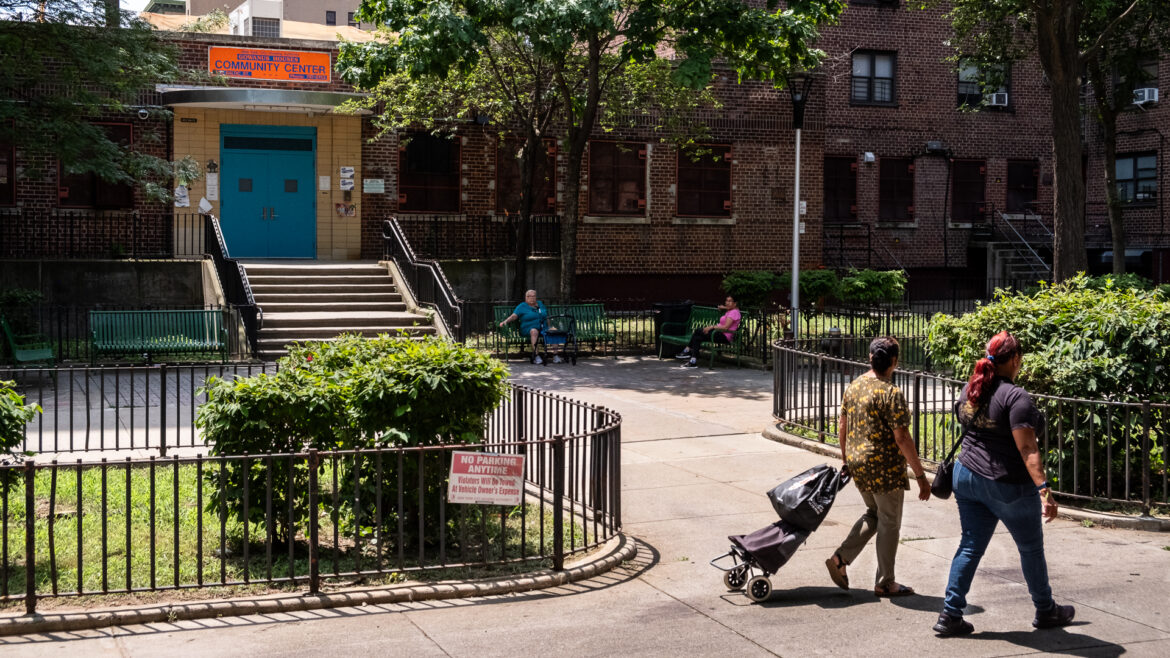“NYCHA needs a radical reformation—one that requires the authority to turn observers into supporters.”

Adi Talwar
NYCHA’s Gowanus Houses.Superstorm Sandy didn’t just flood homes; it exposed the systemic neglect that has plagued New York City’s public housing for decades. As a community liaison in Gowanus, I saw firsthand the power of diverse partnerships uniting to restore services. We were able to push public partners to not only rebuild, but to reinvest in a community center that had been shuttered for decades. This experience solidified my belief that NYCHA needs a radical reformation—one that requires the authority to turn observers into supporters.
Nearly a century ago, Langdon Post, the first chairman of the New York City Housing Authority, published “The Challenge of Housing.” Post provided evidence demonstrating that little can be expected from a private sector that prioritizes profits—comparing them to ostriches sticking their necks in the ground, wagging their tail at the misery of New Yorkers. Today, that fact has not only persisted, it’s intensified for the more than half a million New Yorkers whose politicians have learned nothing, as they continue to believe in private sector solutions to housing problems.
In my 12 years in public housing, from the front lines of resident engagement to the implementation of programming with public-nonprofit partnerships, I’ve seen the crisis unfold. The Authority is buckling under a staggering backlog in capital repairs. The consequences of disinvestment have been devastating. On average, NYCHA takes 370 days to complete a repair—an agonizing wait for residents who regularly feel like second-class citizens. Community meetings echo with stories of leaky roofs, broken heating systems, and persistent mold. This isn’t just about inconvenience; it’s about health, safety, and basic human dignity.
Partnerships, Not Paternalism: My experience has shown that partnerships are key. NYCHA needs to embrace public-private partnerships, like those formed under the Permanent Affordability Commitment Together (PACT) program, to tackle only its capital needs. This isn’t privatization; it’s leveraging the expertise and resources of the private sector to fix crumbling infrastructure and create healthier homes for residents without managing the properties themselves.
Equally critical are partnerships with nonprofits. Grand Street Settlement’s $17 million renovation of the Gompers community center exemplifies this potential. By partnering with the Authority, the nonprofit secured necessary infrastructure upgrades while transforming the space into a vibrant hub for early childhood education, youth programs, senior services, and LGBTQ+ support. This demonstrates how collaboration can leverage public resources and nonprofit expertise to revitalize community spaces within NYCHA developments, and how these partnerships can empower residents.
Empowering Voices, Building Networks: NYCHA is filled with dedicated and knowledgeable staff, but their voices are too often silenced by a siloed hierarchical structure that does not encourage networking, breeding internal divisions. A truly transformed NYCHA would empower employees, involve them in strategic planning and foster a culture of cross collaborations.
Resident leaders must also have a genuine seat at the table, shaping policies that directly impact their lives. It’s time for a new approach; this collaborative spirit must begin in NYCHA’s governance. While the mayor should continue to nominate a CEO, the board should be diversified, including residents from public housing (Section 9 and 8), private and nonprofit stakeholders, and City Council members.
From Reactive to Proactive: Mayoral control, while well-intentioned, has stifled NYCHA’s ability to evolve as an independent agency. A more inclusive board, with its diverse perspectives and expertise, would be better equipped to proactively address policy challenges like climate change and shifting demographics.
We must acknowledge that partnerships are not without their challenges. Competing interests, complex funding structures, and the need for transparent communication can all create hurdles. But with careful planning, clear goals, and a commitment to accountability, these partnerships can be incredibly effective.
A Vision for the Future: The vision for NYCHA’s future goes beyond fixing buildings; it’s about creating pathways to upward mobility. By developing mixed-income housing and homeownership opportunities alongside traditional public housing, we can ensure a sustainable model that truly addresses the need for affordable housing in New York City for the next 100 years.
A Call to Action: It’s time to reimagine NYCHA. I call on all mayoral candidates to work with residents, employees, community leaders, and elected officials to demand a NYCHA board that truly serves its residents and partners as stakeholders. It’s time we solve the challenge of housing.
Metin N. Sarci is a strategic projects manager at NYCHA. This piece is not presented in an official capacity as an employee of the New York City Housing Authority, and all statements represent Sarci’s personal opinions and do not necessarily represent the position of NYCHA.








